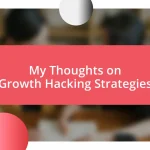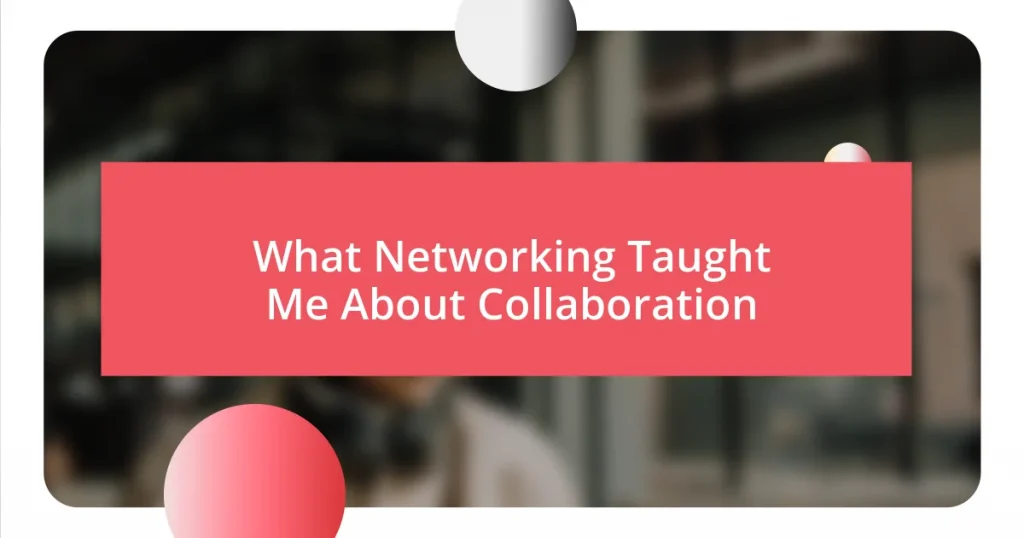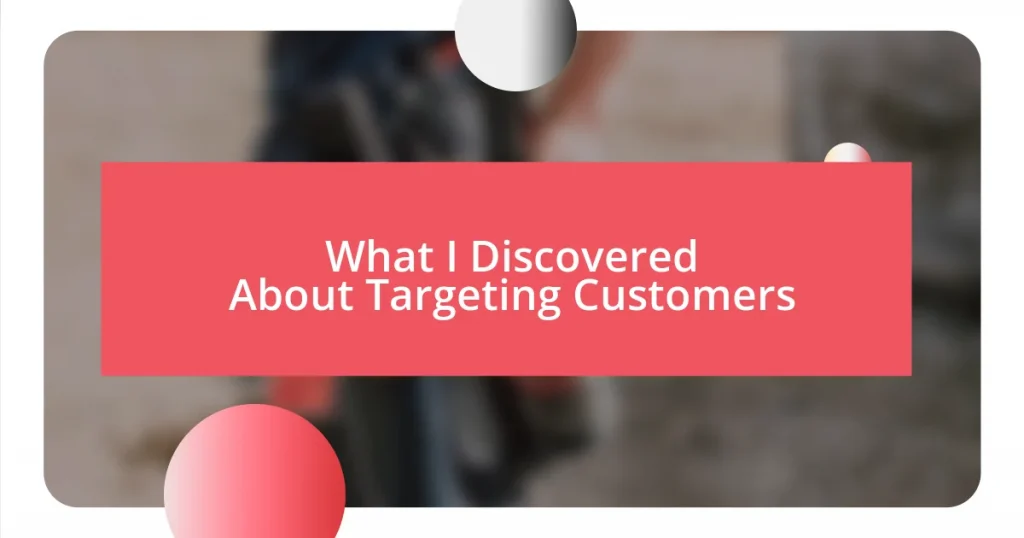Key takeaways:
- Networking is about building meaningful relationships that foster collaboration and open doors for new opportunities.
- Authenticity, trust, and reciprocity are crucial elements for strengthening networking relationships and enhancing mutual support.
- Effective communication, adaptability, and clarity of roles are key skills for successful teamwork and overcoming collaborative challenges.
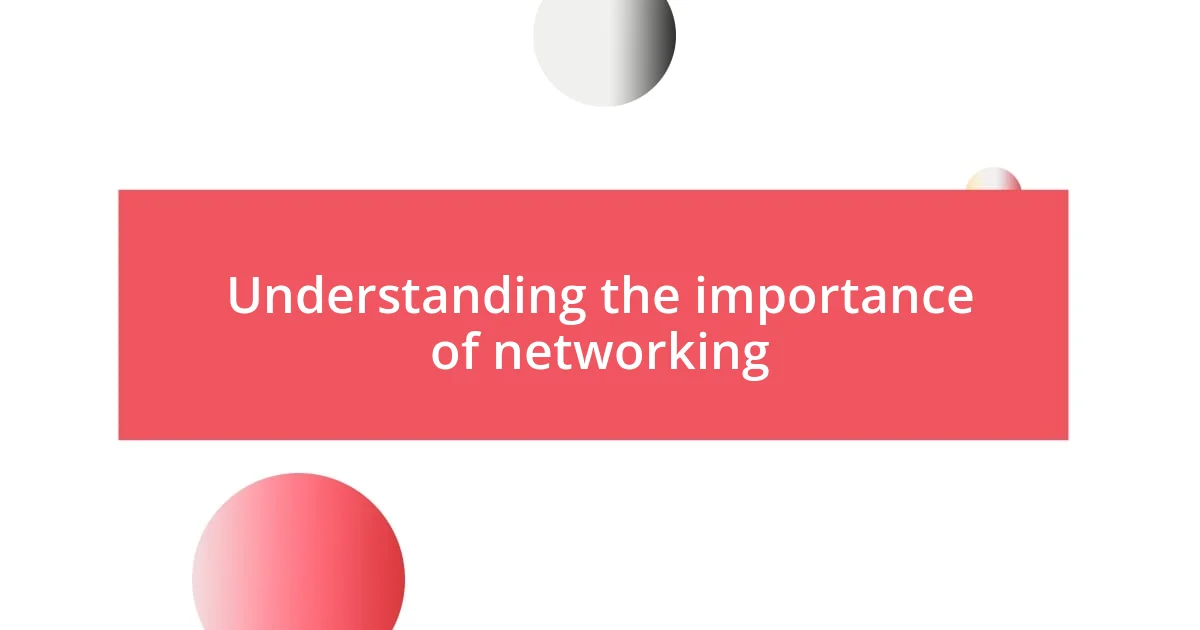
Understanding the importance of networking
Networking isn’t just about collecting business cards; it’s about fostering relationships that lead to meaningful collaboration. I remember attending a conference where I struck up a casual conversation with a fellow attendee over coffee. Little did I know, this simple exchange would later transform into a partnership that brought my ideas to life, illustrating just how pivotal those connections can be.
When I reflect on my networking experiences, it becomes clear that every interaction holds potential. Have you ever considered how a single connection can open doors you never knew existed? I once received an invitation to a project simply because I was recommended by someone I met at a networking event months earlier. It reinforced my belief that relationships are the bedrock of opportunity.
Moreover, networking cultivates a supportive community. I can’t emphasize enough how it feels to have a network cheering you on during challenges. When I faced a setback in my career, it was the people I had connected with who offered guidance and encouragement. This experience not only highlighted the importance of building strong ties but also taught me that collaboration often stems from a foundation of trust and mutual respect.
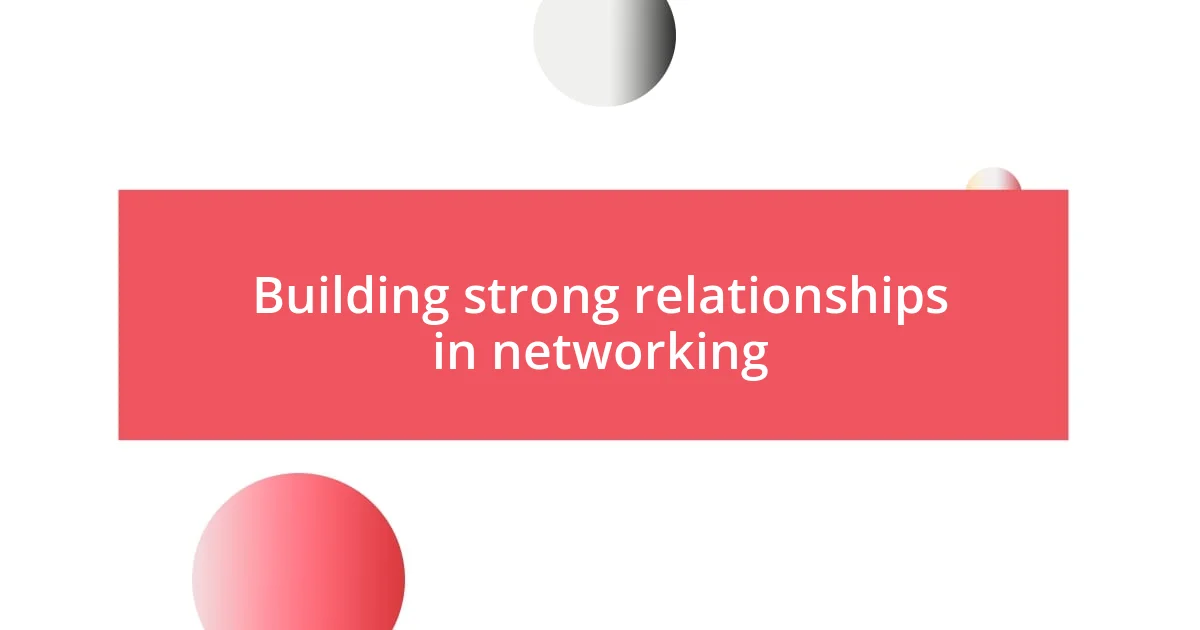
Building strong relationships in networking
Building strong relationships in networking is essential for creating a robust support system. I vividly remember a time when a mentor I met at a workshop took the time to really understand my aspirations. That single conversation blossomed into regular check-ins, where we exchanged insights and strategies. This bond didn’t just help me grow as a professional; it nurtured a sense of accountability that propelled me forward.
Another aspect I’ve noticed is how reciprocity plays a significant role in networking relationships. Let me share an example: when I organized a small community event, I reached out to a past colleague for help. She not only agreed to pitch in but also invited her network, turning a modest gathering into a vibrant hub of ideas and connections. This act of giving and receiving not only strengthened our relationship but also enriched everyone involved. It’s when we support one another that we truly elevate our professional journeys.
Lastly, I’ve always believed that authenticity is the cornerstone of strong networking relationships. I’ve found that being genuine in my interactions creates trust, which is invaluable. For instance, during a casual brunch with another entrepreneur, I opened up about my challenges in the industry. To my surprise, she reciprocated by sharing her own struggles. This vulnerability forged a real connection and initiated future collaborations where we could candidly tackle issues together. It’s moments like these that remind me: the heart of networking is about building lasting ties that foster collective growth.
| Element | Importance |
|---|---|
| Trust | Creates a safe space for collaboration. |
| Reciprocity | Enhances mutual support and resource sharing. |
| Authenticity | Encourages deep connections and engagement. |
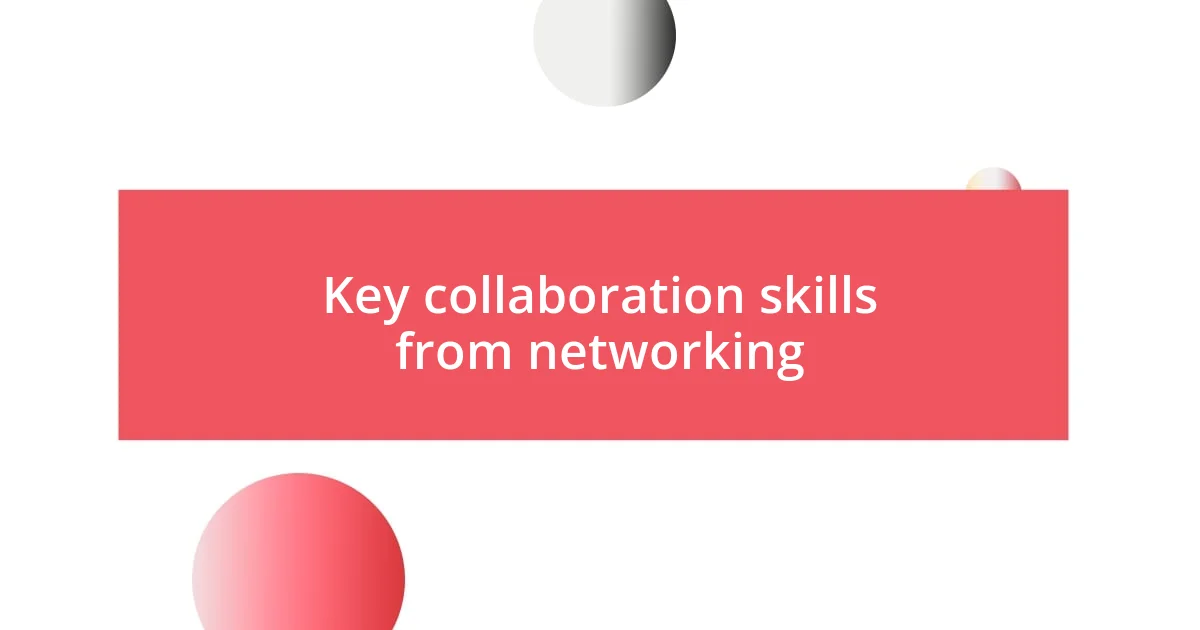
Key collaboration skills from networking
Networking has taught me invaluable collaboration skills, particularly in the area of communication. I still recall a group brainstorming session where diverse perspectives resulted in creative solutions. By actively listening and valuing each contribution, the entire team felt empowered. This experience illuminated the importance of dialogue; when everyone’s voice matters, collaboration thrives.
Another key skill I’ve gleaned from networking is adaptability. In one situation, I joined a project team with members from varying backgrounds and expertise. Approaching it with an open mind allowed us to pivot quickly when faced with challenges. Here are some collaboration skills I believe are crucial:
- Active Listening: Engages others and fosters an inclusive environment.
- Flexibility: Encourages teams to adjust their strategies as new information arises.
- Empathy: Understanding different perspectives helps to bridge gaps in communication.
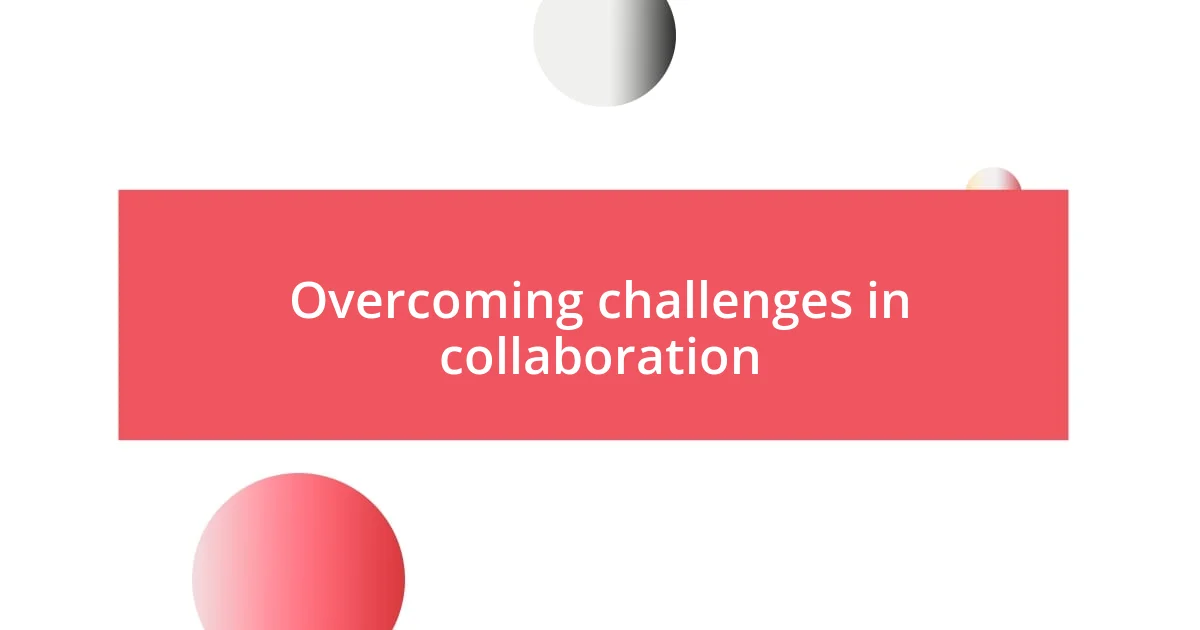
Overcoming challenges in collaboration
Collaboration often presents challenges that require a proactive mindset. I remember facing a particularly tough moment during a joint project where misunderstandings were running rampant. Instead of letting frustration take over, I initiated a team huddle to clarify expectations and align our visions. That simple act transformed the dynamic; we not only addressed the issues at hand but also fostered a deeper understanding among team members. Have you ever noticed how open communication can dissolve tension? It’s remarkable how much a candid conversation can reset the collaborative atmosphere.
Then there are moments when differing opinions surface, threatening to derail progress. In one project, a brainstorming session turned into a heated debate about our direction. Instead of allowing discord to flourish, I encouraged everyone to voice their thoughts without judgment. I found that creating a safe space allowed us to harness those disagreements and turn them into constructive feedback. Isn’t it interesting how friction can sometimes spark innovation?
Yet, the most significant hurdle I’ve encountered is the feeling of imbalance in contribution. I distinctly remember a collaboration where one team member seemed disengaged, which left the rest of us carrying the load. While it was uncomfortable, I chose to address it directly with them. Opening up a dialogue about how we could share responsibilities made a world of difference. Have you ever faced a similar situation? It taught me that confronting challenges head-on can lead to stronger partnerships and a more equitable work environment.
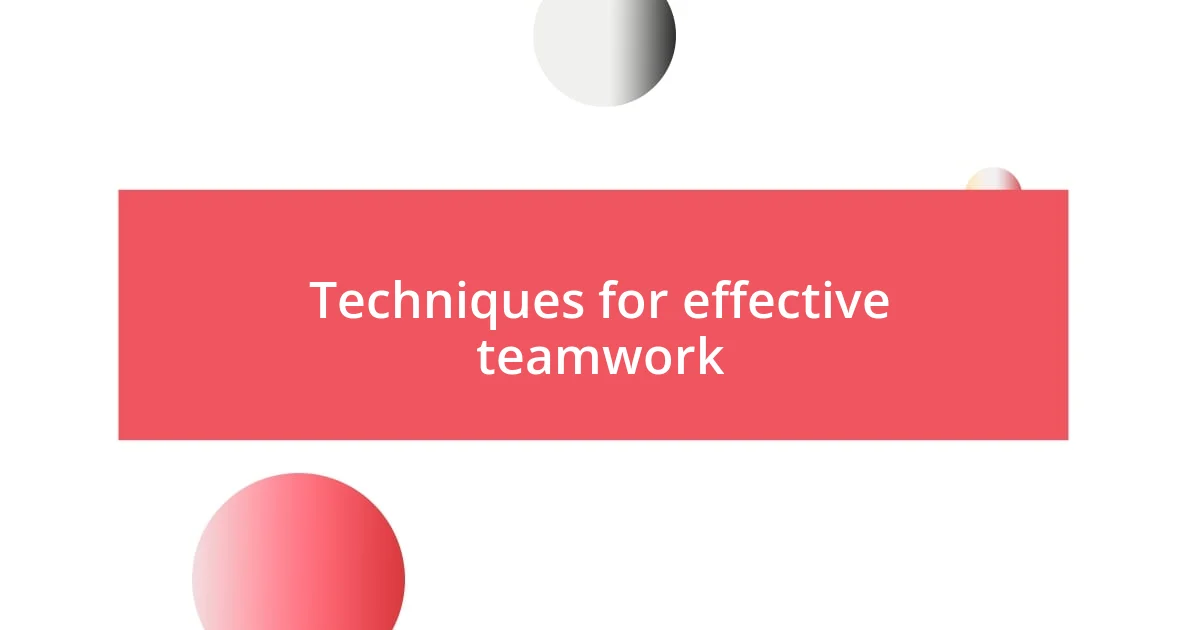
Techniques for effective teamwork
Effective teamwork hinges on the ability to establish trust among members. I remember joining a team for a charitable event, where we barely knew each other. We took the time to share personal stories and motivations behind our involvement. This little exercise fostered camaraderie and openness, turning strangers into allies united in a common cause. Isn’t it fascinating how investing time in relationship-building can elevate productivity?
Another valuable technique I’ve learned is the importance of clear roles and responsibilities. In one project, our initial vague assignments led to a chaotic scramble just days before the deadline. After a brief regroup, we delineated tasks based on each member’s strengths and interests. The sudden shift made a drastic difference; not only did we meet our deadline with ease, but we also produced work that felt truly collaborative. Why do so many teams overlook this critical step?
Finally, leveraging technology can significantly enhance teamwork. During a remote project, we utilized collaboration tools like Slack and Trello to streamline our communication and progress tracking. Real-time updates kept everyone on the same page and, honestly, I found that having visual cues makes follow-ups much simpler. Have you found certain tools that made a difference for your team? It’s amazing how the right technology can transform a group of individuals into a cohesive unit.
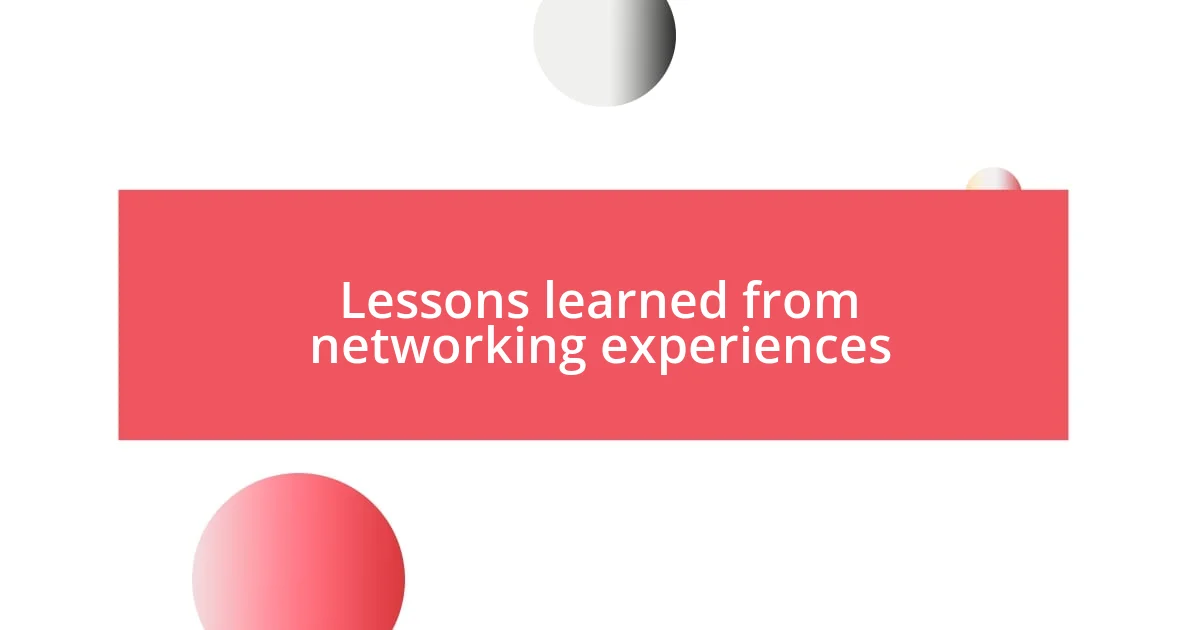
Lessons learned from networking experiences
I’ve learned that the power of listening can’t be overstated in any networking experience. I remember attending a conference where I was initially overwhelmed by the sea of attendees. Instead of just pushing my agenda, I focused on genuinely listening to others, which opened up unexpected collaborations. Isn’t it incredible how much insight you can gain when you simply pause and absorb? This simple act not only enriched my understanding but also fostered deeper connections that later led to fruitful partnerships.
Another lesson I gathered from networking is that vulnerability can act as a bridge for collaboration. During a networking event, I found myself sharing a personal struggle about a project I was passionate about. To my surprise, others resonated with my challenges and began to share their own stories. By laying bare our vulnerabilities, we created an atmosphere where collaboration felt genuine and seamless. Doesn’t it make you wonder how authentic connections can surface when we allow ourselves to be real and relatable?
It became clear to me that collaboration often flourishes through the art of follow-up. After establishing connections at an event, I made it a point to reach out with a personalized message reflecting on our conversation. This not only kept the dialogue alive but also showed my appreciation for their time and insights. Have you considered how a simple follow-up could spark an opportunity? I’ve witnessed firsthand how these small gestures can turn a fleeting encounter into a lasting professional relationship.
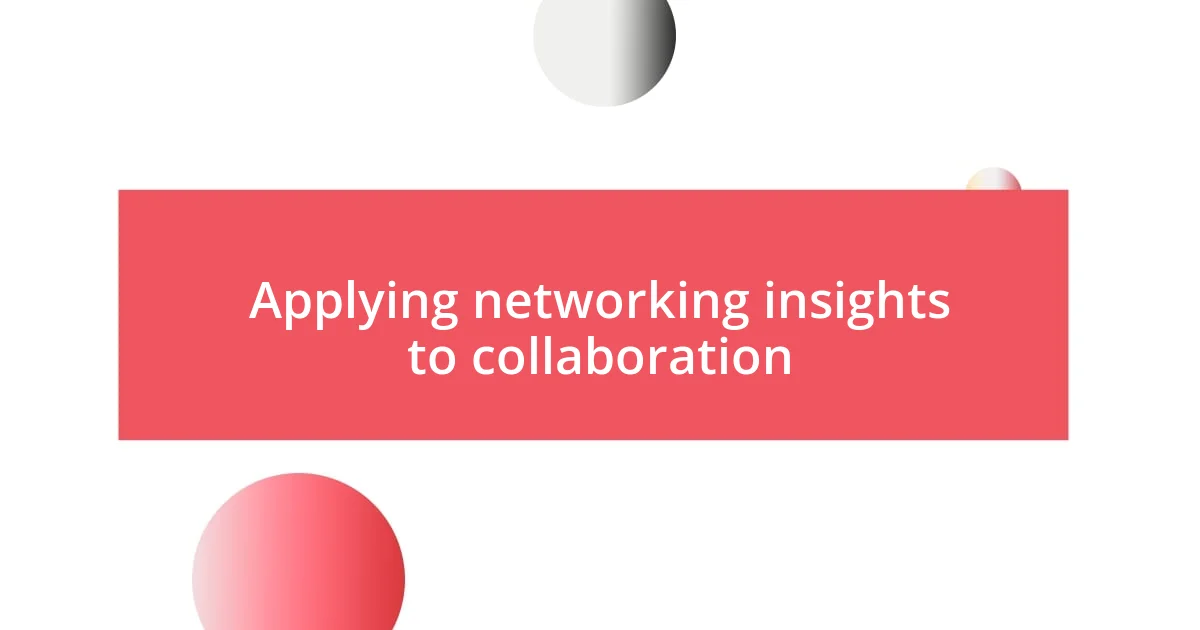
Applying networking insights to collaboration
Picture this: I’m at a coffee shop with a group of friends I’ve met through networking. As we collaborated on a side project, I noticed that sharing our unique perspectives was a game changer. Each member brought a distinct viewpoint that enriched our brainstorming sessions. Isn’t it amazing how collaboration thrives when we embrace our differences instead of shying away from them? I’ve found that a diverse mix of ideas not only solves complex problems but also sparks creativity in ways we never anticipated.
Another insight I’ve cherished is the importance of nurturing relationships over time. I recall reaching out to someone I met at a seminar several months later, just to see how they were doing. That simple gesture led to an exciting joint venture that none of us had envisioned during our first meeting. Have you ever considered how consistent touchpoints can deepen collaboration? I’ve learned that these ongoing connections often lead to unexpected opportunities that keep the collaboration wheel turning.
Moreover, I’ve discovered that aligning our goals from the start makes a world of difference in collaborative efforts. During a recent project, my team and I took the time to outline our individual aspirations, ensuring everyone was on the same page. This clarity not only streamlined our efforts but also created a sense of ownership. Isn’t it reassuring to know that when everyone invests in shared objectives, the collaboration feels less like work and more like a fulfilling journey? It’s these moments that remind me of the profound impact shared vision can have on our outcomes.



